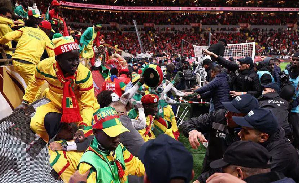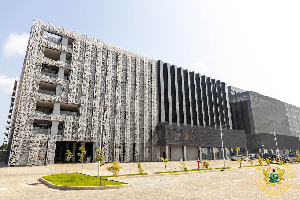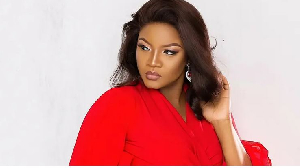By Michael J.K. Bokor, Ph.D.
E-mail: mjbokor@ilstu.edu
The past few days have brought us good news about the status of Ghanaian women in national affairs. For the first time in the country’s history, two women are in authority in the Judiciary and the Legislature. This achievement is remarkable and indicative of what our women can do in national development if barriers that hinder their progress are removed. That’s what I want to say in this article.
The rise to these positions by Justice Georgina Wood (as Chief Justice) and Justice Joyce Bamford-Addo (as Speaker of the fifth Parliament of the Fourth Republic) is good news, which suggests strongly that our women have come into their own to make their presence felt in national life. They can no more be shoved aside in appointments to public office. These new developments are a welcome relief for us to celebrate in a system that has for many generations, unfortunately, remained heavily patriarchal. There is joy on the horizon. Where are the women? Come out of your closets; bring out your handkerchiefs and let’s celebrate! Justice Joyce Bamford-Addo is the Speaker, a position she climbed to with the goodwill of both the Majority and Minority sides in Parliament. Her choice was by consensus, unlike the case of her predecessor who had to be chosen after some hectic balloting between him and the late Peter Ala Adjetey as the then Majority NPP side “fought” with the minority NDC faction in determining who should be the Speaker.
Justice Bamford-Addo has her own bit of uniqueness. We are told that she resigned as a Supreme Court Judge in 2003 in an apparent protest against the lifting of her junior (Justice Kingsley Acquah) above her head for promotion as the Chief Justice by former President Kufuor. Until that promotion was effected, one would naturally have expected her to be the obvious choice, being the most senior Justice of the Supreme Court at that time.
Although no one can tell whether promoting Justice Acquah (a male) over her was part of the male chauvinistic whims and caprices or because of suspicion/fears that she was not in the NPP camp, the issue brought out the stuff of which she was made. Today, she is the first female to become the Speaker of Ghana’s Parliament. Certainly, she joins Nancy Pelosi of the US Congress as a trailblazer. Georgina Theodora Wood, the Chief Justice, is also a record setter, being the first female to have held that post in the history of Ghana’s judiciary. Her appointment came after her work on the committee that looked into the much-publicized cocaine scandal in 2008.
Other women have also occupied important positions both locally and internationally. In all these cases, they have registered their presence in society and called attention to themselves as people who are capable of contributing ideas and resources to the development of humanity. No one who knows the value of these contributions will rush to belittle the potential of our women. And we dare not do so.
As our society works to deepen its democratic culture, it is my hope that more attention will be given to the weaker sex in every way possible so that our females can realize their fullest potential and contribute their quota toward national development. We have come too far in our quest for stability to continue doing what will disparage our females or keep their potential unexamined or unexploited.
Our females have as much to offer the society as their male counterparts think they have. The problem is that our Ghanaian system continues to be largely patriarchal and unappreciative of the role of females. There are too many stumbling blocks on the way; the hurdles are too high for the women to jump with ease. They are doing their best but the systemic hindrances weigh them down all too soon.
Furthermore, some traditional customary practices work against the advancement of females and are difficult to abandon. For instance, widowhood rites continue to be practised in some ethnic groups despite public awareness of their dehumanizing effects. The betrothal of girls to adults and female genital mutilation are outrageous practices that still prevail in some communities. Banishing of women to the Witches’ Village in that part of Northern Ghana is another inimical practice.
The practice of using girls from poor homes as domestic maidservants is a polished form of slavery in modern days but it still goes on in many parts of the country.
Rape and defilement have become everyday happenings. In some instances, especially in remote villages, the perpetrators are not fully punished in accordance with the law because the parents of the victims sometimes opt for some kind of compensation from the offenders’ families to keep mum over the matter. No law enforcement takes place. The victims have no other option but to live with the trauma and physical impairment. Some even die from the harm inflicted on their bodies or from psychological torture. They face other health hazards (e.g., HIV infection) too.
Throughout the years, our women have coped with the pressures of life to become breadwinners of most homes. It is no secret that most families now depend on the resources of the women because they are hard working and earn as much as can make them carry the burden of fending for their families. In this circumstance, however, the women’s “voices” are still not being heard clearly because of the patriarchal nature of the Ghanaian society, which drowns those “voices.” In effect, suppressing women appears to be the norm in most communities.
Let’s take, for instance, the institution of chieftaincy. In ethnic groups where women play the role of kingmakers, there is no doubt that the queenmother has a huge impact on social life. I have in mind the Asantes, for instance, whose matrilineal system of inheritance puts the female in good stead to dictate who should be the accepted and recognized nominee to become the chief of the community. It is the queenmother who must nominate or give her support to whoever is nominated before that person could become an acceptable chief. The queenmother’s word is final in this case.
In instances where there is no consensus on who should become the chief, efforts are always made to get the queenmother’s final say. And she wields much authority in that sense. How many chieftaincy disputes haven’t resulted from the refusal of the queenmother to give her consent to some people aspiring to be chiefs of their communities?
But let’s move this matter further up the ladder to the House of Chiefs, where the queenmother becomes invisible, contrary to her grassroots-level image as a powerful king-maker. In the House of Chiefs, the queenmothers are either missing or not recognized at all. It is a gathering for men (chiefs), whether it is the Traditional Area House of Chiefs, the Regional House of Chiefs, or the National House of Chiefs. Realizing how disempowered they were, the queenmothers made efforts sometime ago to form their own House of Queenmothers; but it ended up in smoke. Or is it still on the drawing board? Maybe. In some cases too, there is no room for queenmothers at all. In the case of the northern parts of Ghana, for instance, I have always heard of male chiefs as a “Na,” “Naba,” or “Kuoro” but nothing about women as queen mothers. I wonder if there is any queenmother in those parts. If there isn’t any, why not? In the Volta Region, queenmothers are recognized but to a limited extent. The situation isn’t any better in the other traditional areas of the country. I know that the pecking order in most of the traditional areas is heavily weighted in favor of the men who control the patriarchal network at all levels of the family, the clan, and the entire tribe. Whether formally educated or not, women are invisible when it comes to the exercise of authority in the strict, traditionally defined domain. And they have lived somehow with that invisibility all these years.
But with the current pace of empowerment in our form of democracy, will it be out-of-place to advocate that decisive action be taken to support women in their bid to emerge more progressively into public life and be given as much recognition as their men counterparts enjoy? I don’t think so. Many are qualified too and must not be side-stepped by male chauvinists who think it is their natural task to build the country alone. The continued struggle of women to rub shoulders with men or to excel in areas not already colonized by men should be supported by all, especially the institutions that have been set up and funded purposely to work for the advancement of females. It is imperative that such institutions intensify their efforts to ensure that whatever should be done to uplift the cause of females is done.
I have in mind such an institution as the Ministry of Women and Children’s Affairs. If the new NDC government decides to retain it in its current form, it should do so and support it fully. On the other hand, if it becomes necessary to replace it with a more functional body, then, everything must be done to get it off the ground. It must move away from the situation where it functions only for political purposes. We can use it do a lot for women without politicizing its very nature and functions.
In the bid to streamline affairs, the government must avoid unnecessary duplication of functions as happened in the days of the National Council on Women and Development, the Department of Social Welfare and Community Development, and the 31st December Women’s Movement, among others. Now, with the addition of Mrs. Theresa Kufuor’s Mother and Child Foundation, the situation has assumed a clear political dimension, which may not augur well for any serious collaborative work for the benefit of women, generally. The line should be drawn between what should function as a state-sponsored institution and a non-governmental organization. Each must perform its functions as defined by the regulations guiding its establishment and operations; but there should be room for collaboration, not unproductive rivalry and competition for the attention of the powers-that-be. It is no exaggeration to say at this point that although the 31st December Women’s Movement has been doing a good job since its formation many years ago, its overtly partisan political nature makes it unattractive to those not subscribing to its ideals. Thus, it doesn’t enjoy overwhelming support and patronage in the ranks of females. Care must be taken in this new NDC government in the extent to which this Movement is supported from official quarters and projected above all others, including the officially designated Ministry that is responsible for women and girls’ affairs.
Our women must have a good reason to be optimistic that they have a bright future in terms of public office. So far, the rise to “fame” and authority by Chief Justice Wood and Justice Bamford-Addo is good news to celebrate. We must, however, know that there is more we can do as a society to support the broad struggle by females for advancement. We must all work together to give every one of them the chance to participate in the race and to be recognized and rewarded for the job if well done.
I am waiting to see a woman emerge as the President of Ghana. We must remember that we always say “Mother Ghana” and not “Father Ghana,” indicating that having a woman in control of affairs will not be strange. It will only be bringing to the fore what is already latent. But our women cannot rise to the top if we continue to belittle their potential and consign them to the back rows of national life.
They are capable of putting their shoulders to the wheel to make it turn the right way. All they need is adequate support, which we must all strive to give them. The examples of those now blazing the trail should spur us on to do all we can for the advancement of our females. We must work hard to use their inherent resources for national development. Together, we can chart a better cause for Ghana.
Opinions of Sunday, 18 January 2009
Columnist: Bokor, Michael J. K.














